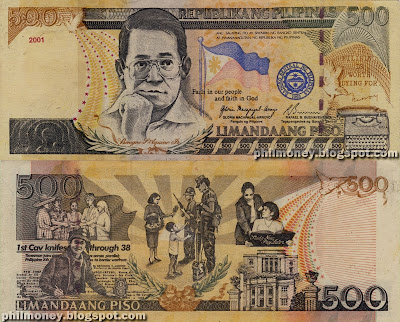 At a glance, can you tell if the five-hundred peso banknote above is a fake? You can click the picture to see a larger view.
At a glance, can you tell if the five-hundred peso banknote above is a fake? You can click the picture to see a larger view.There are many different ways to produce fake banknotes. Basic methods such as printing scanned images of authentic notes will produce counterfeits that are relatively easy to spot. Some groups, however, take counterfeiting seriously and produce copies that increasingly mimic the original.
I recently got to borrow this counterfeit 500 peso bill. Upon inspection, I can guess that this particular fake was created with some serious investment in equipment and technique. I would say this is a ‘professionally made’ counterfeit and probably represents one of the most sophisticated fakes in the Philippines.
Nevertheless, these fakes are still no match against the original. Let’s look at the different parts of this counterfeit money:
 1. It might not be immediately noticed but this banknote has no serial numbers! However, other counterfeits made from scanned notes would usually have serial numbers. Most of the time, counterfeits made in one run would have identical serial numbers.
1. It might not be immediately noticed but this banknote has no serial numbers! However, other counterfeits made from scanned notes would usually have serial numbers. Most of the time, counterfeits made in one run would have identical serial numbers.2. The iridescent vertical gold band on genuine notes only looks like a darkened area on the fake banknote. It does not glitter under the light.
3. You don’t need to look very closely to notice the dirty appearance on Benigno Aquino’s face. Because fake banknotes have coarse details, the eyes are dark and don’t look ‘alive’ as they do in genuine notes.
 4. The interwoven metallic strip is instead printed and does not shine under the light. The little numbers repeated along the thread are missing.
4. The interwoven metallic strip is instead printed and does not shine under the light. The little numbers repeated along the thread are missing. 5. Genuine notes have a rough texture on most printed parts because of the raised prints. Surprisingly, this fake banknote also has a rough texture on some portions although not as pronounced as in genuine notes. On the other hand, the brown pattern on the upper-left hand corner is totally smooth while this is noticeably rough on genuine notes.
5. Genuine notes have a rough texture on most printed parts because of the raised prints. Surprisingly, this fake banknote also has a rough texture on some portions although not as pronounced as in genuine notes. On the other hand, the brown pattern on the upper-left hand corner is totally smooth while this is noticeably rough on genuine notes.6. In several portions of the banknote, misaligned patterns appear, usually where two colors meet.
 7. The microprints are unexpectedly readable but are coarsely printed.
7. The microprints are unexpectedly readable but are coarsely printed. 8. The concealed number does not show when you tilt the banknote towards you at an angle. This might be because the print is not raised like in genuine banknotes.
8. The concealed number does not show when you tilt the banknote towards you at an angle. This might be because the print is not raised like in genuine banknotes.9. Surprisingly, this fake banknote has a watermark when held against the light. Watermarks therefore are no longer good indicators of genuine notes.
10. There is no embedded metallic strip but a dark line appears where it should be when the banknote is held against the light. It appears to have been created using the same technique used to produce the watermark. On the other hand, the metallic strip on genuine notes is darker and can be felt when pinched.
Finally, the fake bill does not smell like money. It smells like old paper. However, if it circulates for a while along with genuine notes, it might also take on the smell of real money.
If you happen to encounter a banknote that you suspect to be counterfeit, report it to the authorities! These ones are not for collecting because mere possession of them is illegal.